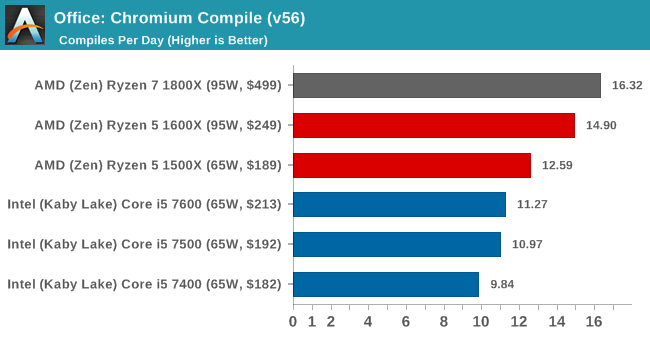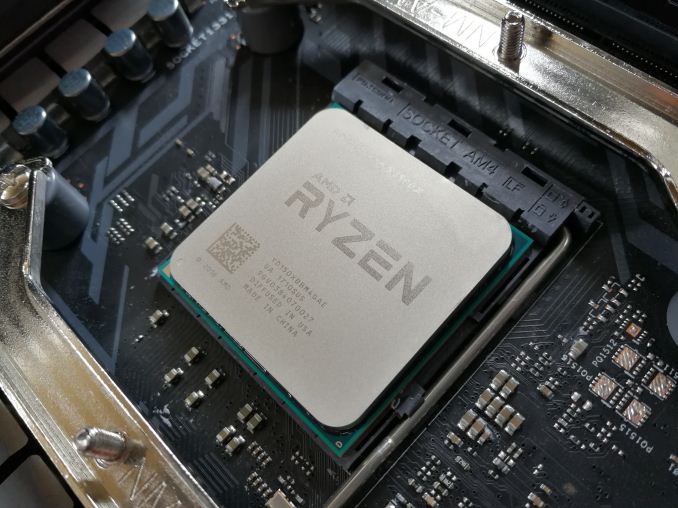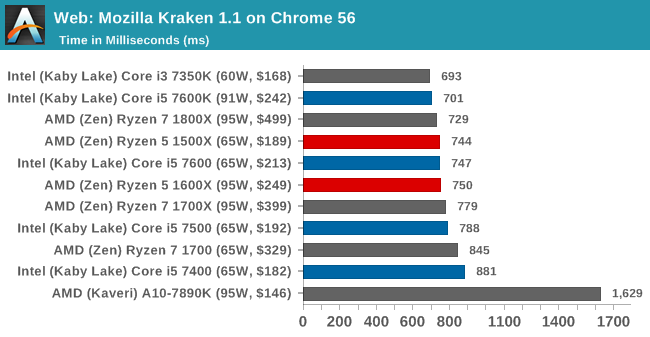The AMD Ryzen 5 1600X vs Core i5 Review: Twelve Threads vs Four at $250
by Ian Cutress on April 11, 2017 9:00 AM ESTAMD Ryzen 5
We mentioned at the top of the review that AMD’s Ryzen 7 launch last month benefited in a market where the competition was extremely expensive – being able to offer equivalent performance in most tasks and then undercut the competition by 50% is a difficult task, but the opening was always there due to a lack of competition in this space. When it comes to the mainstream market, the Ryzen 5 processors are actually competing on price with Intel’s processors directly, and thus has to offer something more to compete.
We have already shown in previous reviews that the Zen microarchitecture from AMD is around the equivalent of Intel’s Broadwell microarchitecture, but at this lower price point we have AMD’s Zen against Intel’s Kaby Lake, which is two generations newer than Broadwell and affords a comfortable IPC uplift over Broadwell. Given AMD’s monolithic design strategy of a single silicon die catering for most of their product line (well, all of it so far), the way AMD is tackling this is through more cores.
Before the debate about cores from AMD’s past rears its head (Vishera/Bulldozer designs in that case), given that AMD’s single thread performance is not too far behind, having a big set of cores as an alternative is something interesting for end-users, especially as more work flows and gaming titles rely on multithreading to scale. As a result, where Intel offer four cores and four threads, AMD is now offering six cores and twelve threads – a potential +200% uptick in the number of threads and +50% in cores, albeit at 10-15% lower instructions per clock.
(There’s also a side argument here about die sizes and wafer costs to each company to consider, but we will leave that for a different piece.)
For this review, based on time and available parts, we tested the Ryzen 5 1600X six-core processor against a set of Intel Core i5 parts that users might also be considering. We have some Ryzen 5 1500X quad-core numbers in here as well, and that might be spun out into a separate review at a later date. We also demonstrated our new 2017 CPU gaming tests, with four GPUs, six tests, two resolutions per test, and a couple of extra extreme resolution tests.
On The Benchmark Results
Looking at the results, it’s hard to notice the effect that 12 threads has on multithreaded CPU tests. The usual culprits show big wins for AMD here: 2D to 3D photo conversion, ray tracing, Blender, Cinebench, Encryption and video transcoding are all sizable wins. This is the sort of workload in which moving up to the Ryzen 7 CPUs, budget permitting, also do well on.
A new test in our suite for this review is a Compile Chromium test on Windows. As part of our testing suite, we have a fixed nightly download from mid-March and set this to compile, taking the final time and converting it into how many compiles per day. For around $250, Ryzen is the only way to go:

As you would expect, AMD still lags in IPC to Intel, so a 4.0 GHz AMD chip can somewhat compete in single threaded tests when the Intel CPU is around 3.5-3.6 GHz, and the single thread web tests/Cinebench results show that.
On The Gaming
Our gaming tests are a mix of Full-HD and 4K testing, some of which ends up being more CPU limited than we expected.
Civilization, at both 1080p and 4K Ultra settings, seem to scale quite happily with more cores on all GPUs, except the GTX 1060 at 4K. It’s worth noting situations such as the R9 Fury at 1080p Ultra only has 920ms under 60 FPS on the 1600X, compared to 6300 milliseconds on the Core i5-7600.
Shadow of Mordor leans towards the higher IPC of Intel, as the DX11 title cannot take advantage of the cores as much. Rise of the Tomb Raider’s benchmark is notorious for having each of its three seconds perform differently with respect to CPU scaling, with the Prophets scene being more CPU limited than the rest of the stage in the game.
Rocket League using an AMD CPU + AMD GPU actually provides more equal results with NVIDIA GPUs, however there's a performance drop using Ryzen + NVIDIA, which potentially correlates towards a driver bug but we're not 100% sure what is going on. Grand Theft Auto is a mixed bag, despite being a DX11 title – in some situations the Ryzen 5 is ahead of the Intel CPUs, or they all perform about the same, or the Intel CPUs pull ahead.
I have $250, What Should I Get – the Core i5 7600/7600K or the Ryzen 5 1600X?
Platform wise, the Intel side can offer more features on Z270 over AM4, however AMD would point to the lower platform cost of B350 that could be invested elsewhere in a system.
On performance, for anyone wanting to do intense CPU work, the Ryzen gets a nod here. Twelve threads are hard to miss at this price point. For more punchy work, you need a high frequency i5 to take advantage of the IPC differences that Intel has.
For gaming, our DX12 titles show a plus for AMD in any CPU limited scenario, such as Civilization or Rise of the Tomb Raider in certain scenes. For e-Sports, and most games based on DX9 or DX11, the Intel CPU is still a win here.












254 Comments
View All Comments
mmegibb - Tuesday, April 11, 2017 - link
Where did you get your info about OC'ing the 1600? I haven't seen much about OC'ing the Ryzen chips, at least in these initial comprehensive reviews. (I haven't searched much either). I still haven't decided between the 7600k and the 1600x, and how the 1600x overclocks will be a factor.haukionkannel - Tuesday, April 11, 2017 - link
All Ryzens in all test have been running between 3.9-4.1 in all owerclocking test. So it does not matter what Ryzen you get. The oc performance is the same. Must be because if the manufacturing proses. This could be a beast if made by intel factories ;)MrSpadge - Tuesday, April 11, 2017 - link
No, such a hard an consistent speed limit is usually by chip design. If it was "just the silicon lottery" there'd be more spread, like you see with Intels.Outlander_04 - Tuesday, April 11, 2017 - link
https://www.youtube.com/watch?v=3VvwWTQKCZsi5 and Ryzen 5 at good OC's
cheshirster - Wednesday, April 12, 2017 - link
People are already bying 1600, it runs 3.8 OC on a box cooler1600X has no room to overclock at all
cheshirster - Wednesday, April 12, 2017 - link
+1600bobbozzo - Tuesday, April 11, 2017 - link
Hi Ian, on the last page,Rise of the Tomb Raider’s benchmark is notorious for having each of its three _seconds_ perform differently
I think that should be 'scenes' not seconds.
Thanks!
mmegibb - Tuesday, April 11, 2017 - link
In the gaming benchmarks, Intel generally has higher average framerates. But, interestingly, in the 99th percentile and time-spent-under-60fps, Ryzen usually tops Intel. To me, this translates into an overall smoother and more consistent game play experience with the Ryzens. Is that right?I've been on Intel processors for years. In fact, my son still is doing heavy-duty 1080P gaming with an OC'd i5-2500k. But, soon I'm going to replace that beloved CPU, and I want to buy a Ryzen just to upset the apple cart and do something different.
I've been disappointed in the Ryzen 7 reviews as far as gaming is concerned. But, this review gives me hope. I'm really thinking that triple the threads of the i5-7600k with only a small loss of gaming performance is the way to go. Especially with DX12 getting more common.
Achaios - Tuesday, April 11, 2017 - link
Αs a gamer, what you are primarily interested in is Single Threaded Performance simply because there's a host of games out there that depend on Single Threaded performance:1. All World of Warcraft versions.
2. All Total War versions.
3. Starcraft II.
4. Civilization games.
...and so on. The OP is just giving you a review tailored to make Ryzen shine whereas in fact it still is an inferior CPU for gaming due to inferior Single Threaded performance.
Very few games use for than 2-4 Cores, so that makes Ryzen largely irrelevant at the moment. It will also be irrelevant in the future too when games will begin utilizing more than 4 cores, because there will be -by then- far better Intel & AMD processors.
mmegibb - Tuesday, April 11, 2017 - link
Yes, forever gaming reviews have hammered the idea that all that matters is single threaded performance.However, as I mentioned, this review shows the 1600x beating the 7600 in 99th percentile and time under 60fps, even in games like GTA V. Those are very important benchmarks for gaming quality perception. You didn't talk to that at all. You just repeated the boilerplate about "single core" that we all know.
Also, I don't think it will be too far in the future when more games use DX12, and that seems to make a big difference.
I think I'm getting a whiff of "intel-fanboy" from your post.